
Halle Bailey in The Little Mermaid
THE LITTLE MERMAID
Despite only a few diversions from the 1989 narrative and the addition of a mere three songs, director Rob Marshall's largely live-action take on Disney's The Little Mermaid runs almost an hour longer than its 83-minute animated predecessor. Given the traditional bloat of blockbusters-to-be and the fact that humans can't move or emote as quickly as their cartoon equivalents, this was hardly a shock. What was unexpected, however, was that Marshall's remake hit the two-hour-15-minute mark while also removing one of the original's best-loved tunes, and the deletion of “Le Poissons” from the repertoire says a lot about the movie. Too much, I'm afraid.
You remember “Les Poissons,” right? That upbeat, French-flavored ditty in which royal servant Chef Louis croons about, and demonstrates, the joie de vivre he takes in hacking sea life to pieces while poor Sebastian tries to avoid Louis' cleaver, mallet, and big silver pot? In the animated Little Mermaid, the song, which features some of Alan Menken's and Howard Ashman's snappiest lyrics, is a slapstick riot: fast-paced, colorful, and filled with the kind of outsize comic threat and violence (on the deceased) that manages to tickle even little kids who might otherwise be traumatized by the goings-on. It's also a brief, witty break from the burgeoning romance between Ariel and Prince Eric, to say nothing of the evil machinations of the sea witch Ursula – a delightful little amuse-bouche before the weight of the full meal kicks in.
As much as I missed hearing it, however, the inclusion of “Les Poissons” in Marshall's telling wouldn't have been appropriate considering the work's overall tone, which is decidedly more earnest, serious-minded, and, yes, human-scaled than its forebear. I really wish I meant that as a compliment. Thanks to its source material (the Disney, not the Hans Christian Andersen), there are a bunch of charming scenes in this Little Mermaid, and a fair number of its updates are actually quite winning, such as the moment in which Ariel gets Eric to figure out her name without saying a word. Ariel portrayer Halle Bailey, meanwhile, is about as wonderful a live-action Disney princess as you could want, her stunning vocals blending gorgeously with the performer's effervescent curiosity and yearning. What's been lost in the translation from 1989 to 2023, though, is spirit – the oceanic depths now look realistically murky, but the whole movie feels gloomier, and more resistant to “Les Poisssons”-y lightness and vigor, than it should. Even the musical's raucous, Oscar-winning calypso number feels sluggish, and despite occasional appearances by multi-hued fish, it's hard not to notice that the colors on land, especially in the newly imagined marketplace sequence, are more vibrant than they ever are under the sea. Marshall's The Little Mermaid is sincere, reverent, safe. What it isn't, and what the original continues to be, is a joyous blast.
This stylistic switch from musical-comedy vivacity (with elements of melodrama) to Titanic-esque grandeur (with random songs and jokes) might not have been so jarring – or, for some of us, so disappointing – if the filmmakers weren't caught in the typical bind associated with live-action remakes of Disney's animated classics: Their audiences, the thinking seems to be, want something new in terms of presentation, but also want the exact same thing as before. Yet more often than not, barring visual cues such as the wave crash that coincides with Ariel's climactic note on the “Part of Your World” reprise, the replications here don't take.
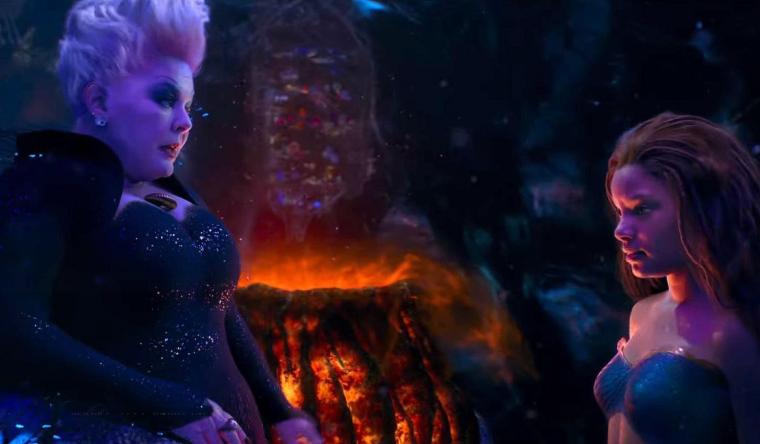
Anyone who's seen him in Hamilton either on Disney+ or live on stage (lucky bastards) knows that Daveed Diggs is powerfully talented. He doesn't, however, produce a convincing Caribbean accent, and his comic timing is off, and so Diggs' awkward vocal performance as Sebastian the crab can't help but recall, with a sigh, the laughs generated by the more confident, relaxed Samuel E. Wright. Melissa McCarthy is in a similar boat. With the exception of a lightning-quick bit, following one of Ursula's temper tantrums, that finds McCarthy speaking with her distinctive comic cadence, she isn't delivering fresh malevolence so much as a feature-length impersonation of Pat Carroll, and the animated sea witch was both scarier and infinitely funnier than the one we get here. (No other figure in Disney history has gotten such riotous mileage out of the shake and bounce of her bosom.)
Just about every time you make the mistake of comparing Little Mermaids, the 1989 offering wins out. The previous movie's speedy, exciting shipwreck is now badly photographed, incoherently edited, and endless; the gruff, short-tempered patriarchy of King Triton is exchanged for the dour melancholy of Javier Bardem; the newly “realistic” depiction of lovable sidekick Flounder (voiced by Jacob Tremblay) makes you gasp for the poor fish every time he pokes his head out of the water or, worse, finds himself lying on his side on the deck of a ship. Nice as it is that Eric has been granted a backstory, a lovely scene of bonding over tchotchkes, and even a whole song of his own, Jonah Hauer-King isn't more noticeably charismatic than his cartoon counterpart, who is rightfully remembered as one of the dullest of all Disney princes. And don't get me started on Awkwafina, who makes sense as a replacement for Buddy Hackett, but whose sea bird Scuttle is excruciatingly obnoxious, and whose newly added rap number suggests that composer Lin-Manuel Miranda might win a Razzie before he completes his EGOT.
Did any of this appear to bother the many children who were at my weekend screening, several of whom I saw carrying in their Ariel dolls and jumping up and down with pre-show anticipation? I couldn't tell, because barring occasional chuckles from their adult chaperones, I didn't hear any vocal reactions to the movie at all. I'll quickly add, though, that I also didn't hear any restlessness – and given the frequency with which she's on-screen, I have to credit that to the delicate magic exuded by Halle Bailey. As with the 1989 version, this film's conception of Ariel is somewhat limiting in that, once her voice is taken away, much of her personality is, too. Bailey is a talent, though, whom you can happily watch even when she's doing next to nothing, and with no shade tossed toward Jodi Benson (who makes a fleeting cameo as a marketplace vendor), this remake's lead is the one bona fide improvement on its predecessor.
In terms of its pacing and composition, much of Marshall's work here is plodding and uninspired. Whenever I got bored, however, Bailey's emotional expressiveness was there to cheer me up. She never overplays Ariel's adolescent anguish, preferring to render the mermaid's frustration as a reasonable and understandable ache for more, and when she stares in wonder – at her sea trinkets, at the lavish digs of the royal home, at Eric – Bailey's eyes and awed smile appear to take it all in, these wonders of a world that feels both impossibly foreign and yet precisely where she needs to be. Live-action Ariel may not be as funny as cartoon Ariel, but she's a far more dynamic and touching presence, and Bailey's singing is so soul-stirringly beautiful that even your billionth hearing of “Part of Your World” can reduce you (okay, me) to a blubbery mess. All Disney-remake bummers should be so lucky as to have Halle Bailey as their star, and seeing that, this Christmas, she'll be playing Celie's sister Nettie in the film version of Broadway's The Color Purple only makes me antsier to see what this dazzlingly gifted artist delivers next. She may not be able to save Disney from Disney, but Bailey may make movie musicals better for the foreseeable future.
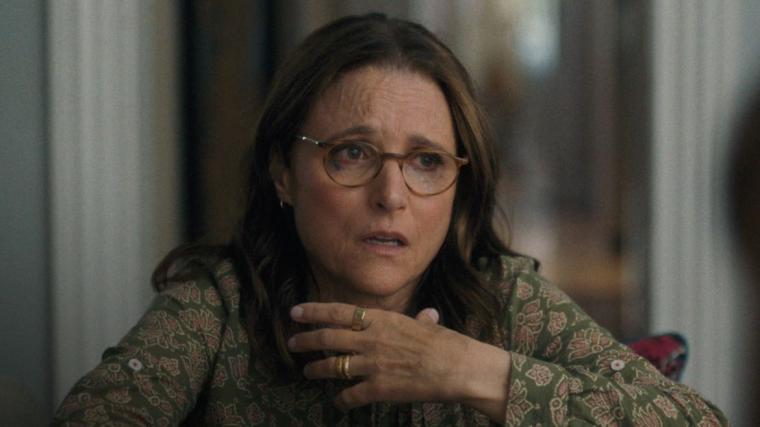
YOU HURT MY FEELINGS
Like most of her previous works, writer/director Nicole Nolefcener's latest comedy You Hurt My Feelings is hilarious yet lightly biting, and it provides Julia Louis-Dreyfus with one of her all-too-rare screen leads, which would in itself be reason enough for a visit. But it might also be one of the most divinely empathetic movies released in recent years, because anyone who's ever been in a relationship with anyone – a lover, a family member, a friend – can recognize and relate to its plot-goosing convention: the little white lie that, once revealed, winds up having catastrophic (or rather “catastrophic”) effects. You'll likely laugh a lot at You Hurt My Feelings, but as with so much successful cringe comedy, you'll probably do so while simultaneously wincing.
Even though it may initially remind you of a certain phrase involving mountains and molehills, the hook of Nolefcener's film is a tremendous one. Louis-Dreyfus plays Beth, a Manhattan-based author whose recent memoir about her verbally abusive father received solid praise and amassed decent sales. (As Beth tells her mother, played by the ever-tart Jeannie Berlin, “Maybe if he had been physically abusive it would have done better.”) Now Beth is dozens and dozens of drafts into her first novel, a work-in-progress that her loving husband Don (Tobias Menzies) has repeatedly read and claims to love. But during a shopping excursion with her sister Sarah (Michaela Watkins), the siblings stumble upon Don and Sarah's husband Mark (Arian Moayed) in a department store, and decide to sneak up on the men while they're staring at the sock wall. And it's there that, with the guys being unaware of their spouses' presence, Beth overhears Don telling Mark the formerly unthinkable: He doesn't actually like her new book. At all.
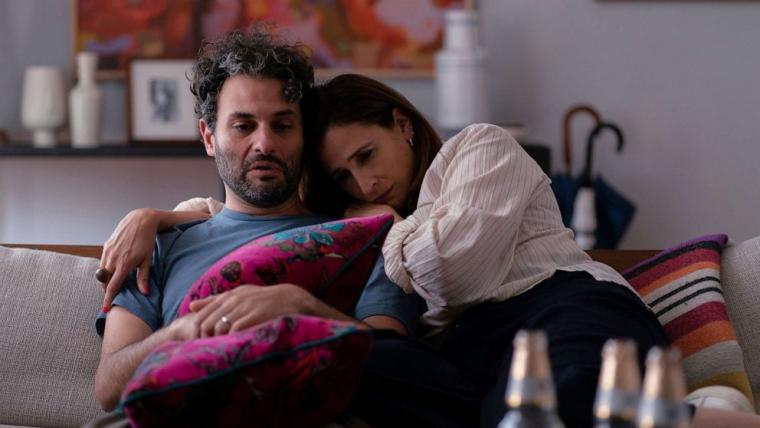
As you'd imagine, this leads to a fantastic Julia Louis-Dreyfus mini-meltdown. But it also leads to something even finer: a trenchant, thoughtful, moving exploration of feelings-sparing untruths that never forgets to stay sensationally funny. Because it turns out that everyone is equally guilty and victimized by the fudging of facts in You Hurt My Feelings. Beth doesn't tell Don that she hates the leaf-shaped earrings he buys for their every wedding anniversary. Don, a therapist, has a group of patients that considers him useless, even though they continue to pay for sessions. (The meanest and most riotous of them, married complainers portrayed by the actually married David Cross and Amber Tamblyn, hate Don just a little more than they hate each other.) Beth and Don have so collectively built up the esteem of their son Elliott (Owen Teague) that he's become blind to the warning signs in his own love life. Sarah doesn't tell her actor husband that he is, every so often, a terrible actor. In her home-decorating career, Sarah's chief client refuses to just come out and say that Sarah's taste is awful. On and on it goes, and it becomes impossible to not see yourself in not merely one but several of Holefcener's comically troubled characters – financially stable, fashionably PC figures who would be among the first to agree that “honesty is the best policy” unless it means being truly honest themselves.
So few feature films aim for well-constructed, hysterical, hyper-articulate dialogue anymore (you basically have to go to streaming TV for that these days) that Holofcener's fabulously quotable conversation, with its ratio of roughly three audible laughs per minute, is like an oasis in the desert. Yet the movie is also a treasure trove of acting opportunities, and beyond Louis-Dreyfus' perfectly scaled blend of intentionally overscaled comic misery and genuine heartbreak, the cast here performs wonders, with the best-in-show including the complexly vexed Menzies, the eminently huggable Moayed, and the expertly sardonic Watkins, who should have been cast as Louis-Dreyfus' sister decades ago. (The resemblance is uncanny!) With its swift 90-minute running length and narrow focus on a particular subset of privileged Manhattanites, You Hurt My Feelings isn't exactly a major work. But it's a brilliantly realized minor work with major pleasures, and one boasting a powerful message, to boot: When gossiping about your spouse in public, before you say a word, always always always look behind you first.
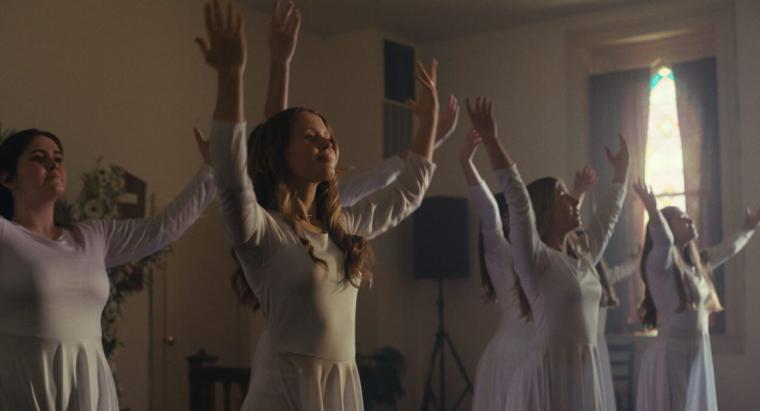
THE STARLING GIRL
Because six movies premiered locally this past Friday, and because I needed to maintain a degree of sanity given other holiday-weekend obligations, I knew I could only reasonably get to five of them. The two releases preceding this particular review seemed of greater importance (and personal interest), and the two following it were likely to make more money (and did). So for flick five, I was torn between The Starling Girl, an indie drama about a devoutly religious teen who embarks on an affair with her youth pastor, and Kandahar, a Gerard Butler action thriller by the director of Angel Has Fallen. So, ya know, “torn between” isn't really accurate.
I think I made the right choice. A feature-film debut for writer/director Laurel Parmet, The Starling Girl is a spectacular showcase for 24-year-old Australian actor Eliza Scanlen, who here assumes a wholly convincing drawl as 17-year-old Jem Starling. Born and raised in rural Kentucky, a state she has never left, Jem lives amidst a community of strict fundamentalist Christians, one of whom, early on, brings Jem to tears by revealing that she could see the outline of the girl's bra during her dance-worship routine. Jem wants nothing more in life than to be wholly free of sin, or what others perceive as sin – at least until the return of 28-year-old youth pastor Owen Taylor (Lewis Pullman), a married, half-bearded, routinely sweaty hunk newly back from a service project in Puerto Rico.
You don't need experience with after-school specials of yore (though I definitely have it) to know where this scenario is going to lead, and if there's a detriment to Parmet's observant script, it lies in the easily predicted formula of its narrative arc. Although there are enticing diversions in the slipping recovery of Jem's loving, alcoholic dad (a marvelous Jimmi Simpson) and the unacknowledged opioid addiction of her brittle mom (Wrenn Schmidt), scene after scene transpires kind of precisely the way you anticipate, with the members of Jem's congregation viewed solely as stereotypes and little of their interaction suggesting the fulfillment that some may find in their faith. (As is the norm in movies about the fastidiously devout, we're asked to view these people, pretty much without exception, as suspiciously friendly monsters.) Yet Jem's and Owen's burgeoning sexual relationship is suffused with real hunger and emotional danger, and as a director, Parmet pulls off a couple instances of vandalism and violence that made me audibly gasp: one involving the keying of a car, and one involving a quicker-than-expected punch to the face that was as shocking to me as it must have been to the blow's deserving recipient. (Of course, it's easier to gasp aloud at a movie when you're the only one in the auditorium, as I sadly was on Sunday afternoon.)
Running nearly two hours, Parnet's coming-of-age saga is probably 20 minutes longer than it needed to be, as there's a lot of repetition in Jem's crises of faith, plus at least two potentially strong endings before the decent one we ultimately get. Yet The Starling Girl is still excellent. Pullman, who's like a more-handsome version of his beloved character-actor dad Bill Pullman (a pretty handsome dude in his own right), is exceptional here, planting Owen's waverings between faith and horniness with just enough seeds of doubt to make you edgily uncertain about whether this youth pastor with the bedroom eyes is love-addled or unimaginably cruel. And Scanlen is a marvel. Ever since her twinned breakouts as Amy Adams' possibly psychotic half-sister in 2018's Sharp Objects and the sadly doomed Beth March of Greta Gerwig's Little Women in 2019, this young talent has been spectacularly inscrutable, somehow merging (and visually implying) the steadfast integrity of Alison Pill with the lurking deviance of Mia Goth. Scanlen gets to play both notes in her expansive star turn here, and I imagine that as the years pass, these bursts of performance music will grow into something utterly symphonic.
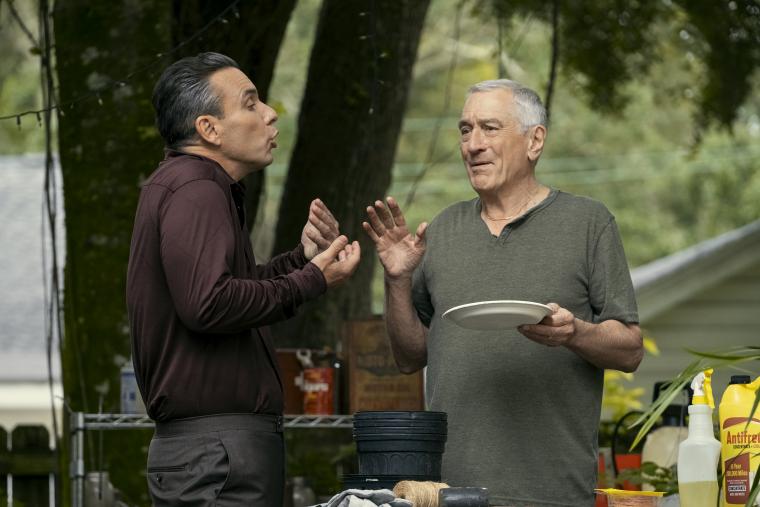
ABOUT MY FATHER and THE MACHINE
In terms of counter-programming to the presumed box-office behemoth The Little Mermaid, I get why a studio would choose to use the four-day Memorial Weekend window to premiere an agreeably goofy slapstick featuring a noted standup comedian – one whose character shares the same name as its star – dealing with his daddy issues. Why on earth would another studio decide to do the same?! But there you have it: Director Laura Terruso's About My Father, which finds Sebastian Maniscalco sharing the frame with screen dad Robert De Niro, opened directly opposite director Peter Atencio's The Machine, which finds Bert Kreischer sharing the frame with screen dad Mark Hamill. Both movies made roughly equal money. The Little Mermaid made roughly 10 times their collective gross. The number of people floored by this turn of events is roughly zero.
Although I've never seen one of his standup sets, just as I've never seen any of Kreischer's, I do remember Maniscalco's topnotch performance in Martin Scorsese's The Irishman, in which his mobster “Crazy” Joe Gallo was memorably gunned down by De Niro's Frank Sheeran. The previews for About My Father made it appear that Maniscalco was now exacting revenge. Terruso's movie is essentially a 90-minute reprise of Meet the Fockers, another De Niro comedy in which the acting legend and his famously dyspeptic mug were forced to hang out with in-laws he didn't believe his child deserved. This one finds De Niro's Sicilian hairdresser Salvo contending with the brood of son Sebastian's intended (Leslie Bibb), a clan so WASP-ily entitled and Protestant that its patriarch could only be played by David Rasche. (Between Rasche's presence here and Arian Moayed's in You Hurt My Feelings, it was a good weekend to be reminded that even though Succession ended on Sunday, its performers will go on.) About My Father is exactly what you expect it'll be. And I mean exactly. The comic humiliations of Maniscalco and the well-to-dos; the labored sentiment between Sicilian father and son; the fish-out-of-water weirdness and miscommunications and ultimate redemption for all … . Is it possible that, the current writer's strike notwithstanding, artificial intelligence effectively replaced flesh-and-blood authors long before the strike got underway?
Apparently not, because the film's script is officially credited to Maniscalco and Austin Earl. And even though it's largely crummy, the movie itself, astonishingly, isn't without laughs, and isn't even without moments of legitimately touching, recognizably funny human behavior. In the manner of most standups-turned-film-stars, Maniscalco is too aggressively “on” for much of the picture, and his performance here gave me no reason to ever seek out his comedy specials, which I'm (maybe wrongly) presuming are more of the same. But you can tell that he really, truly worships De Niro, and that affection bleeds into the duo's scenes together, and the supporting cast is terrific: the unflappable Rasche, of course, but also Kim Cattrall as his Republican-senator wife (she has a killer scene with De Niro as they blow cigar-smoke rings at one another), and Anders Holm as a Donald Trump Jr. wannabe, and Brett Dier, whose turn as the family's black-sheep “healer” delivered a smile with his every appearance. Bibb is terrific, wholly pulling off exaggerated comic energy with a gusto reminiscent of Bess Armstrong's in the 1980s. (It's unfathomable that Bibb is 48, as she boasts the unforced perkiness of someone half that age.) As for De Niro, he stays in character and never lapses into the cartoonishness that has made the actor so depressing in many of his 21st-century comedies. Despite the grimace, De Niro seems legitimately happy to be here. For a considerable percentage of About My Father, amazingly, I was, too.
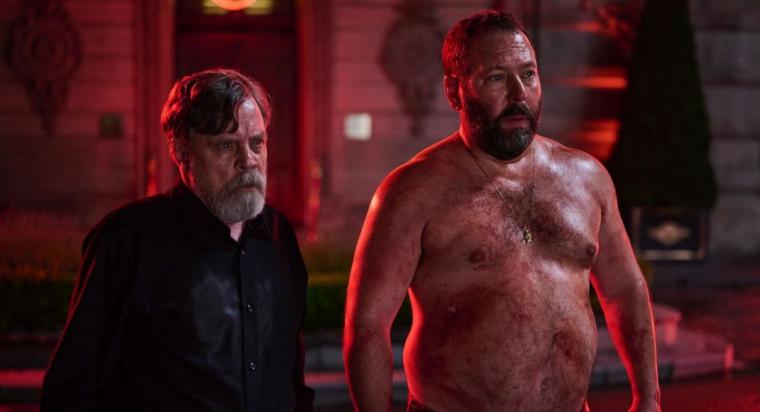
If I had previously little firsthand exposure to Sebastian Maniscalco, I had even less direct awareness of Bert Kreischer beyond recognizing him as that comedian with the dad bod who seemed allergic to shirts. I've gleaned, however, that he has a famed standup routine that has become an international sensation – one that describes Kreischer's experiences as a student abroad who wound up embroiled with the Russian Mafia. Peter Atencio's The Machine, with its script by Kevin Biegel and Scotty Landes, is a feature-length expansion on that routine, and a rather cleverly constructed one, at that. We see the mid-1990s adventure (with American Vandal star Jimmy Tatro doing a quite-strong impersonation of young Kreischer), but also its sequel, with Kreischer and Hamill forced to return to Russia to find the stolen watch of an incensed Russian oligarch. The movie is a wreck. I frequently laughed like hell. Not as much, mind you, as the obvious Bert Kreischer fanatics who were also at my sparsely populated screening – all four of them sitting alone, and all of them routinely cackling at lines that didn't strike me as remotely funny.
Then again, in-jokes aren't meant to be funny to those on the outside, and I did find plenty in the sophomoric, unexpectedly gory The Machine to giggle at. My biggest chuckle came from Kreischer's observation, passed on to a native Russian, that an Eagle Scout is “like James Bond if he were a Mormon.” But there's also a handful of truly satisfying gross jokes (the best one finding Bert punching his way into an assailant's neck and his fist getting stuck there), and Hamill is clearly enjoying being cast way beyond type (though he does occasionally unleash a glorious Joker giggle), and Iva Babić, as Kreischer's mobster handler Irina, is a real find. Funny and gorgeous and potently dramatic and abjectly fearless, this is nearly as stunning a mainstream breakthrough for an unknown European actor as Maria Bakalova's in Borat Subsequent Moviefilm. Kreischer, meanwhile, is probably no one's idea of a sustainable comedic lead; it's hard to imagine what other roles his intensely specific frat-jerk-gone-to-seed stylings might conceivably lead to. But he isn't bad, and every once in a while, a newbie such as myself could see what others apparently do, particularly after he whipped off his shirt – finally! – and announced, prefacing a gruesome skirmish, that his alma mater of Florida State University was about about “fighting, f---ing, and drinking beer … and I'm terrible at f---ing.” Taken overall, Kreischer is merely okay in The Machine. Put him in a Scorsese, though, and I bet he'd kill.










